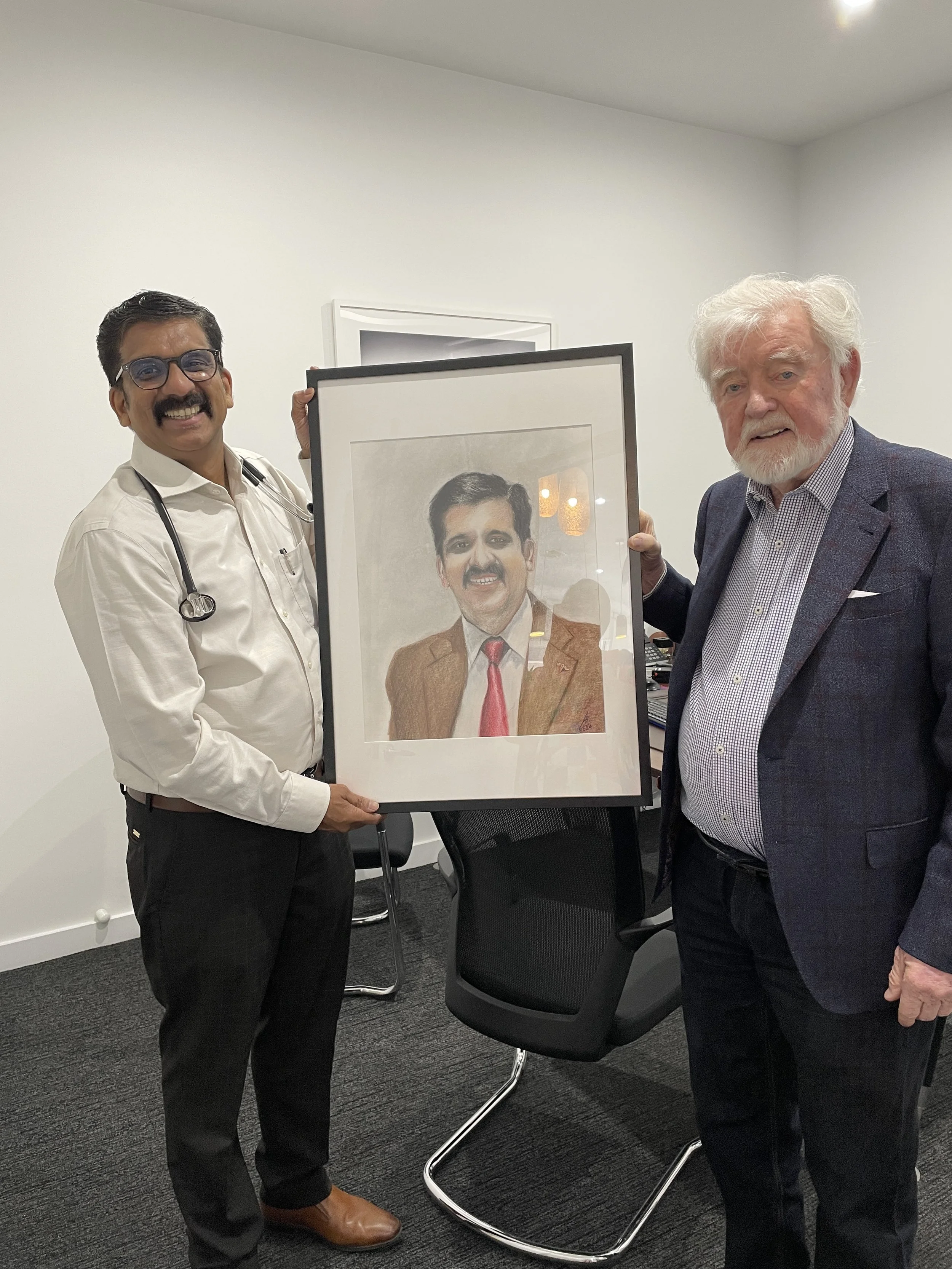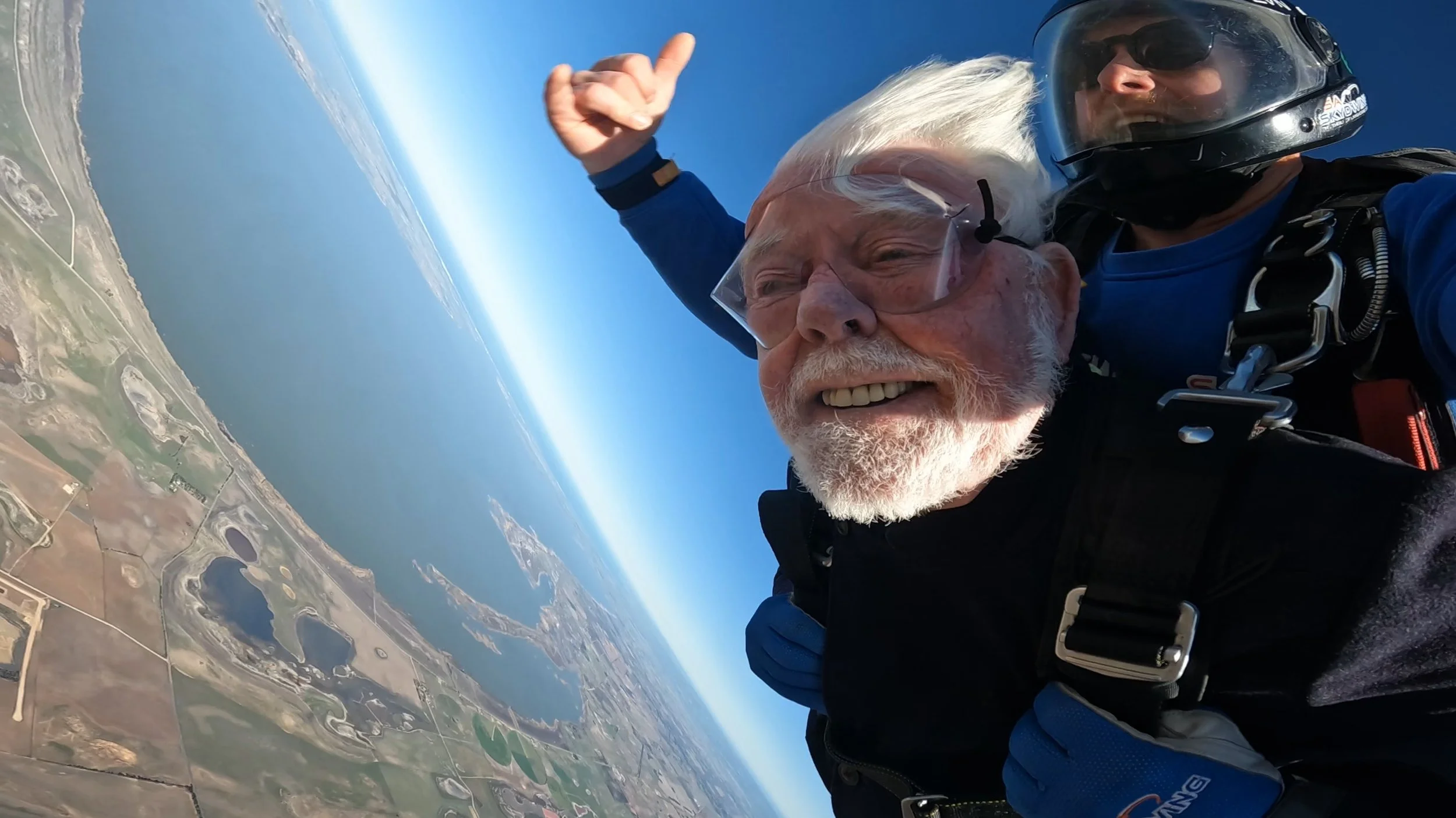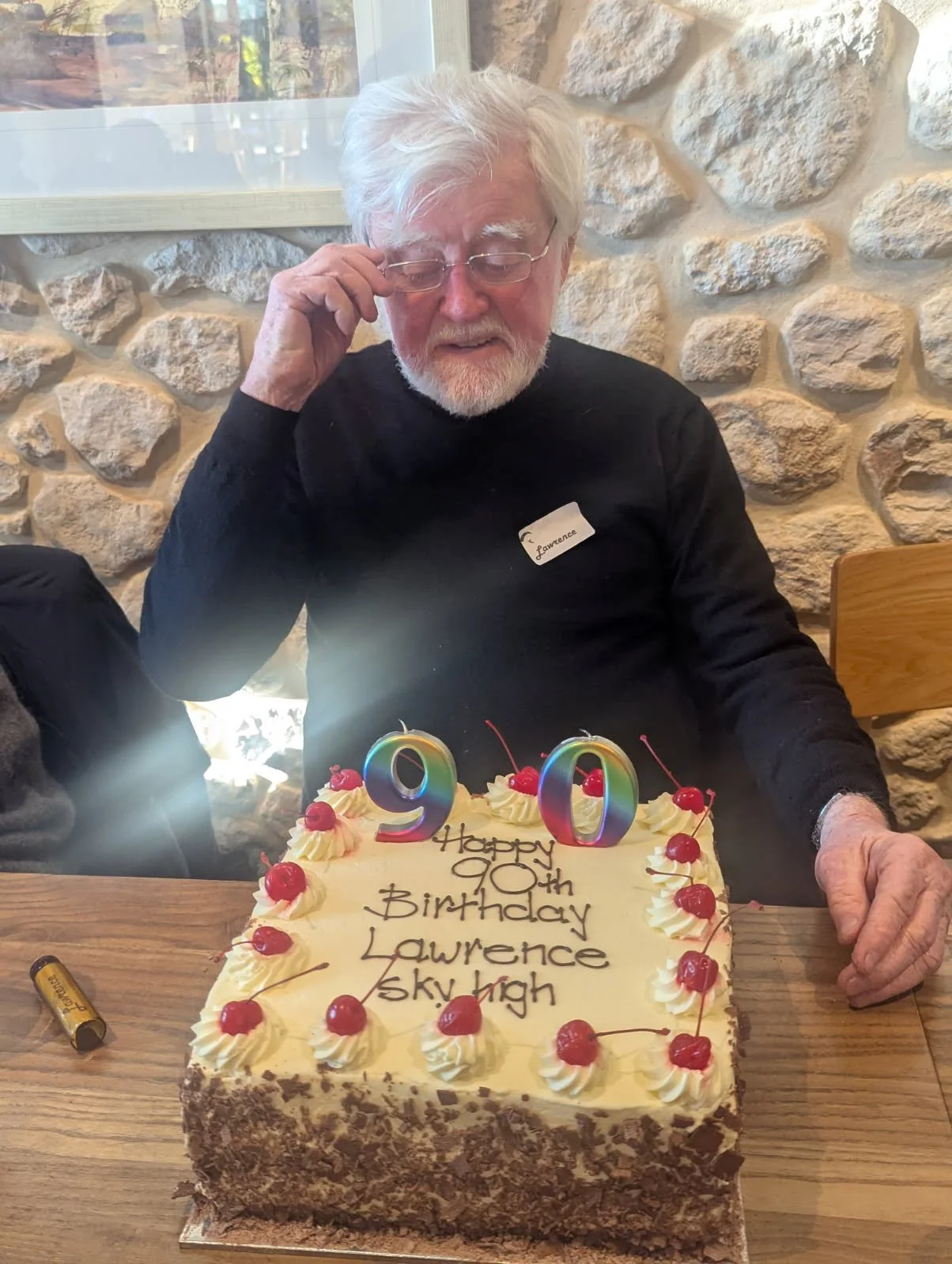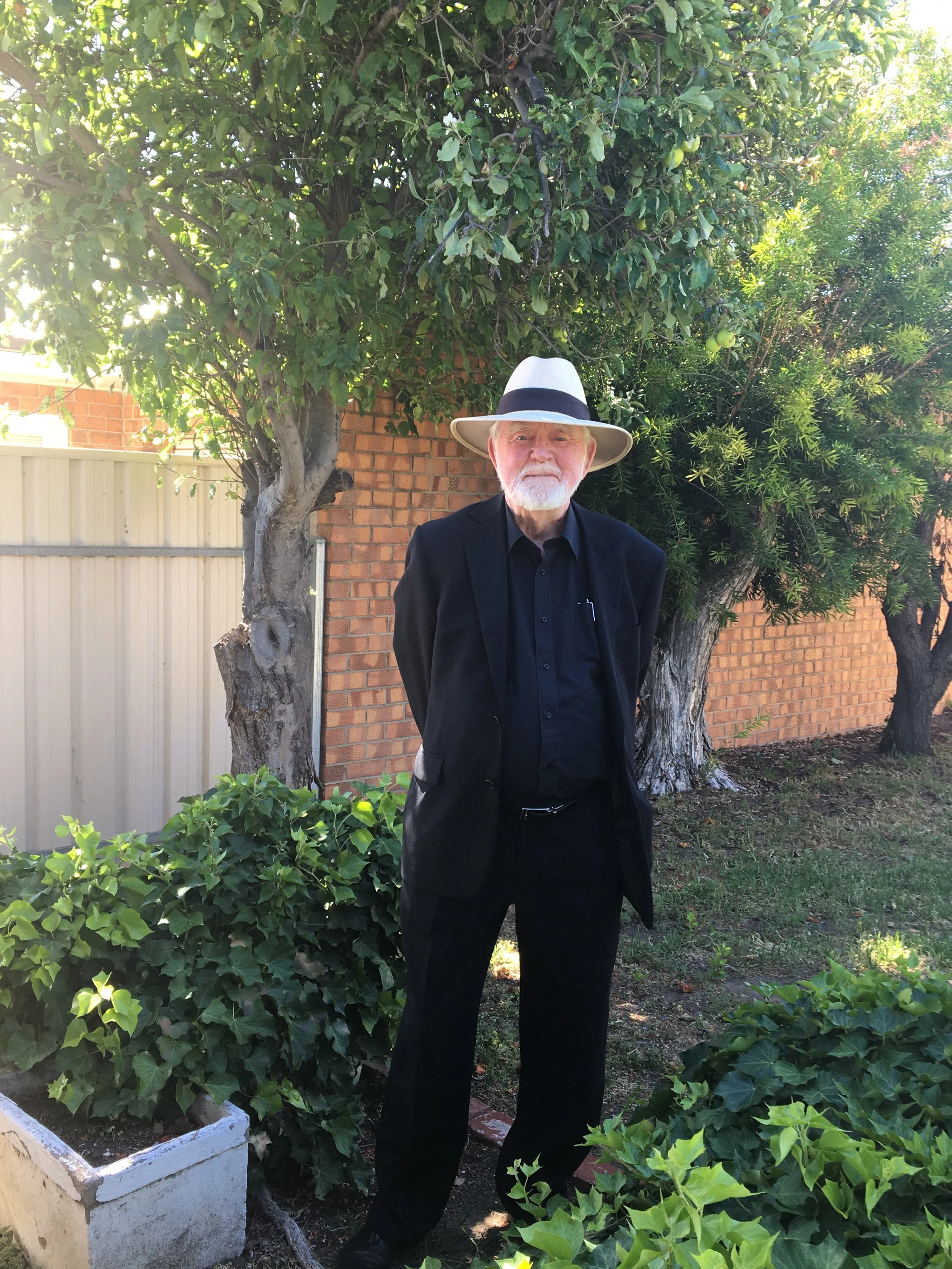Lawrence Brown
Ship name / Flight number: RMS Maloja
Arrival date: 1952
Lawrence’s Story
In 2025 I turned 90 years of age and what follows is a condensed version of my life story.
I was born in Edinburgh, Scotland in the summer of 1935. I was the youngest of the family, with two brothers and a sister. Harry was ten years older than me, George was eight years older and my sister May was three years older.
Although both my parents were born (and met) in Liverpool, they did not come from English stock. My mother’s parents emigrated from Ireland during the potato famine and my father’s grandparents were born in Scotland.
In 1915, my sixteen year old father lied about his age to join the army in World War I. At the end of the war, he was in Belgium when the army quartermasters were selling off surplus military equipment. He and others got quite wealthy selling this equipment on the black market. He knew this was against military regulations, so he went AWOL for 18 months until he ran out of money and handed himself in. He was court-martialled and sent back to England. When they realised he had been under-age when he joined up, they gave him an honourable discharge. By the late 1920s, my father’s job was head waiter in the 5-star Caledonian Hotel in Edinburgh.
I have happy memories of my childhood until I was about ten years old. In 1946, my father ran away with a sixteen year old girl. He ended up in the Channel Islands and took over a restaurant from someone who had been a German collaborator during the war.
His last year in our house was not so pleasant. By then, there was just my sister and I at home as both my brothers had gone to sea - Harry had joined the Royal Navy and George the Merchant Navy. When my father left home, my mother struggled to support us as there were no social services in those days. My brothers would send some money home and my mother eventually got a job as a barmaid. I didn’t see my father for the next fifty years.
After World War II ended, a shipload of German small arms that had been rendered inoperable came into port at Granton. There were railway carriages full of pistols that were destined for the smelter. All the kids in the neighbourhood went to the railway siding, took some guns, disassembled them and made working guns from the parts. I had a German Luger at the age of eleven. It sounds dangerous but we never got our hands on any ammunition.
Three years after my father left, my mother married her childhood sweetheart who was widowed by then with a seventeen year old son. He lived in Liverpool so we all moved there. In Edinburgh, I had been attending Holy Cross Academy, a catholic school where I had a classical education studying English literature and French and Latin. In Liverpool, while attending the Toxteth Technical Institute, my education changed direction completely with lots of maths and sciences. My life changed when I was 14 years old but it was about to change even more.
My step-father wasn’t very keen on me so he organised a job for me on the other side of the world as an apprentice with the Western Australian Government Railways as an electrical fitter. Once it was organised, my mother took me to the station in Liverpool and I caught a train to London and made my way to Tilbury Docks. I had just turned 17 and I didn’t even know I was emigrating under the auspices of the BBM until I got on the boat!
There were about 20 other ‘Little Brothers’ ranging in age from 14-21 years. Our escort was an Australian fellow who had been skiing in France and Switzerland and saw the opportunity to get a free trip back to Australia. We sailed on the RMS Maloja which was part of the P&O Line and stopped at exotic places like Algiers, Port Said, Aden and Trincomalee.
We berthed in Fremantle, Western Australia in early August 1952. I disembarked and was met by a couple who drove me to Midland Junction about nine miles east of Perth. I fronted up to the Western Australian Government Railways office and told them I was there to start my apprenticeship. They looked at me blankly and told me that they were not putting on any apprentices at the moment as their metal workers were on strike.
I had five shillings in my pocket and nowhere to sleep. I was on the other side of the world with a no more than a Scottish accent and a suitcase. The man I was talking to took pity on me and told me to wait in the office while he made some enquiries. When he came back, he offered me a temporary job as the yardman at the Midland Junction Hotel. I had to break up the ice around the copper coils that the beer was pumped through to ensure the beer was served cold. I also had to replenish the ice in the bar, chop wood, clean up the yard and sweep out the bar. In return I was given food, lodging and a small cash payment. I played darts with the locals in my spare time. This was my new home. I stayed for three weeks before I chucked it in.
A bunch of guys staying at the hotel came from Marble Bar in the Pilbara where they were working at an alluvial tin mine at Cooglegong near the Shaw River. I asked them if there was any chance of getting a job. They suggested that I go and talk to their boss, Jonno Johnson, who was staying at the Savoy Hotel in Perth, which I did. Overnight I stopped being an unemployed railway apprentice and became a mine worker.
After I landed in Australia, I had no further contact with the Western Australian Government Railways or the BBM. I survived on my wits, luck and instinct. When I moved to Marble Bar in my first month, I didn’t tell the BBM so that ceased my connection with them.
For the next 18 years I worked in the Pilbara and Kimberly regions. I started out in the tin mines, then I got a miner’s right and went with a mate prospecting for gold in Bamboo Creek - without success. I was then offered a job for a few months in the state-owned mining battery feeding the crushing machine with ore. Then the Marble Bar State Battery, followed by the Twenty Mile State Battery outside of Nullagine.
One night in the Nullagine pub, after a few months of shovelling ore into crushing machines, I was offered a more permanent job at the treatment plant at the Blue Spec Gold and Antimony Mine near Nullagine.
After a few months, I decided it was time for a change and packed up my swag and headed for Darwin via Broome. I had read Forty Fathoms Deep by Ion Idriess, and wanted to see where part of the novel was set. When John Ley, manager of the Blue Spec gold mine, heard I was going to visit Broome, he gave me a letter of introduction to someone in Broome. I thought this was nice, but unnecessary, so I filed it in the bottom of my swag.
I flew from Marble Bar to Broome and took a room in the Governor Broome Hotel. I was sitting on the verandah one afternoon when a couple of policemen came and told me to move on. I didn’t know why as I’d done nothing wrong! Then I remembered that I had a letter of introduction, so I dug it out and saw that it was addressed to Sam Male, who was President of the Broome Road Board. He had a local pearling business called Streeter and Male, and owned a general store and several pearling luggers. I went to his office and the receptionist asked me to wait while she took the letter to him. A few minutes later, out came a little rotund man who stuck his hand out and said, “Pleased to meet you, Lawrence. John Ley says some good things about you”. He asked me if I’d like to stay in Broome, and I said I couldn’t as I’d been told to move on by the police. Sam Male told me not to worry about that – “I’ll fix that”, he said.
It seems that Sam spoke with the publican of the Governor Broome Hotel, Ralph Hancock, because I was very soon being paid to whitewash the roof of the Governor Broome Hotel where I was staying. My next job was manager of the ice works where we also made soft drinks. I had two Aboriginal staff to help make and deliver ice and soft drinks. After that, I got a job on a pearling lugger as a shell opener. There were Asian and Aboriginal workers on all the boats. Back then, Broome had an official population of only a few hundred people because Aboriginal people weren’t counted in the census in the 1950s.
After one season on the lugger, I had a series of jobs including driving a truck for the meatworks, and building the main road between Derby and Broome. While I was in the road gang, my mother tried to track me down by writing to the Governor of Western Australia. I hadn’t written home to my mother and she was worried about me. Somehow the Governor was able to track me down while I was working as a labourer on the road between Derby and Broome. One day a man pulled up in a flash car. The foreman called me over to the car and the Commissioner of Main Roads asked me who I was. When I told him my name, he said something like: “Your mother’s been looking for you. You should write home!”.
The list of jobs was long and varied and included: serving customers and stacking shelves in Kennedy’s store and barman at the Roebuck Bay Hotel in Chinatown.
In 1956, we were notified that a cyclone was approaching Broome so we closed the bar. I went to nearby Sheba Lane to collect my girlfriend and we went together to a sturdier house for safety. While the cyclone was raging, I saw an Aboriginal friend, Gabriele, walking towards the police station. Upon asking him why he was out in the cyclone, he replied “I think they’re all dead, they’re under the house”. I rushed out and ran towards his house. The house had been lifted off its stumps and had not dropped back squarely on the stumps. The family had earlier sought safety under the house so now they were trapped and calling out. I went for help at a nearby Japanese diver’s house and four men came with me. We grabbed a verandah post and levered the house enough to drag the four or five people out. Among the people was a woman who was pregnant – she passed away later but her baby survived.
One day in Fremantle, 50 years later, I was at a food hall having lunch by myself when a group of Aboriginal people came in. I helped to make space for their wheelchair by swapping tables. I noticed that they had ordered a hot Malaysian dish (roti prata) and thought this was unusual fare for Aboriginal people so they must come from Broome. On my way out, we started chatting about their food choice and they said they were indeed from Broome. We began to compare notes about Broome, the people we knew and the cyclone. Their name was Puertollano and I had known an Alf Puertollano in Broome. I thought I was talking to Alf Puertollano’s son but it was his grandson! After talking about the cyclone, the grandson’s wife, who had just turned fifty, stood up and put her hand on my shoulder and said “I was that baby”. We kept in touch after that and she brought her sons from the Pilbara to meet me in Fremantle.
An opportunity came up to buy a taxi – there were only five taxis in Broome at the time. One of the pearling masters bought the taxi licence for me and I paid it back over the next 18 months. The taxi fare to anywhere in Broome was just two shillings and you could pick up other fares as you were driving customers around. I had that business for about 18 months before it went broke. I was giving away too many rides, mostly to ladies I was seeing. The problem was, after we had split up, they expected free taxi rides forever! To rescue my finances, I gave up taxi driving and became a wharfie instead.
From taxi operator to wharfie – yet another career change came along when I was offered a job as a taxi driver in Derby – about 100 miles north of Broome. However, by the time I got there somebody else had taken the job. Instead, I took a job as a labourer at (what became known as) the Public Works Department in Derby.
After a while I was offered the job as truck driver. One of my jobs was to transport men and equipment to jobs around town including repairs to the timber jetty at the port in Derby. One day there was a Blue Funnel Line ship in the port loading cattle. I parked the truck next to a large Ford which I knew belonged to the local stock and station agent, Bob Rowell, whose cattle were being loaded onto the ship. From my elevated seat I could see down into the front seat of the car and noticed a fat roll of bank notes. As nobody locked their cars in Derby, I took the money to give to him on the ship. I went up the gangway and asked the officer if Bob Rowell was on board, but I was told he was in a meeting with the captain and not available. I had bolts to deliver to the repair crew, so I explained about the money, gave it to the officer to pass on to Bob Rowell and continued with my delivery. About a week later, I saw Bob Rowell and asked him if he had got his money. He said yes, he did, quite a few thousand pounds – the money needed to pay for the shipment of the cattle. He was grateful as the money had been left in the car by mistake.
A few weeks later, the engineer in charge of the Kimberley area who also worked in the Department of Public Works asked me if I’d like to be an engineering-surveyor. I said I’d give it a go. He put me with a young engineer who taught me how to use a dumpy level and a theodolite.
For the next 12 years, I learnt on the job – jobs such as construction works for the Derby jetty, Wyndham jetty and the Broome jetty (a 5 year project). My mother visited me twice in Western Australia. Her first time was when I was 21 years old and running my taxi service and then again when I was 30 years old. She visited Perth, Broome and Derby.
Then I was transferred south to Bunbury to conduct investigation surveys for the proposed new Bunbury inner harbour. At the same time, I attended technical school in the evenings to study for a diploma in engineering-surveying. I was about 40 years old by then. When we were doing the practical parts of the course, the lecturer would split the class in two and he and I would each teach a group of students how to use the instruments.
In 1973 I was transferred further south – to Albany – where I was working on the extension of the wharf facilities and the construction of a 600 ton slipway. Then, in 1975, I was transferred back to Perth where I was one of the surveyors in a new Coastal Investigation Section of the Department of Public Works. My job was to measure beaches in remote coastal areas of Western Australia to provide important data for the construction of future marine facilities. I did this for about 15 years.
In about 1990, my job became office-based when I became a planning officer in the Fremantle office. This work involved using my knowledge of tidal data around the coast of Western Australia for canal developments and coastal investigations. Then, in 2009 after 48 years of service, I retired from the Department of Transport (previously the Department of Public Works) and moved to Adelaide.
On a personal note, I met my first wife, Clare, in Broome and we had a daughter, Natasha. I met my second wife, Laura, in Albany and we had four children together. Sadly, she died young and I had to foster out the twins, Sally and James, and our youngest child, Victoria. I continued to care for our oldest son, Andrew, who was nearly four years old when Laura died. I was a single father for a while and fortunately my workplace was understanding and allowed me to work in the office instead of the field, so I could be there for Andrew as much as possible. I married again when Andrew was about nine years old, but in 2008 my wife Connie died of pancreatic cancer, seeing out her last weeks at her son’s home in Adelaide. I keep in touch with my children via telephone as they live in different states of Australia.
In 2009, I moved permanently to Adelaide. My brother George was already living there and I had liked Adelaide when I had taken Connie there to spend the remaining weeks of her life.
My eldest brother Harry was in the Royal Navy during the war. After the war he became a ship’s engineer in the Merchant Marines. He was on board a ship that docked in Fremantle when he came down with appendicitis and the ship had to sail without him. He met a lady in the hospital, got married, had a tribe of kids and moved across the continent to Queensland and then Tasmania. Harry passed away at the age of 84.
My other brother George met an Australian lady while working as a radio operator on a ship travelling from Melbourne to England via South Africa. They hit it off. She disembarked in South Africa and George went on to England. Eventually they were married in Melbourne. He had a keen sense of adventure so he accepted a job on South Georgia Island in Antarctica to run the island’s radio operations in the mid-1950s. His wife wrote a book about their experiences called Antarctic Housewife. After a few years they swapped ice for desert and moved to Alice Springs where George was in charge of the Royal Flying Doctor Radio Operations for 13 years from 1957-1970. His wife started the first travel agency in Alice Springs. George wrote a book about his life experiences called My First 80 Years. George passed away at the age of 84. My sister May remained in England, married and brought up a family in Liverpool. May passed away at the age of 92 in 2024.
I didn’t see my father again until 1996 when my father was 97 years old and I was 61. We had been strangers for 50 years. My eldest brother had contact with my father’s siblings and had found out where our father was living. Harry, George and I met with him in London where, over a bottle of Johnnie Walker Blue Label Scotch Whisky, he told us his life’s story. He died when he was 99 years old.
In 2010, we four siblings had a great family reunion in Adelaide. George and I were already living there, May flew from the UK and Harry travelled from Hobart.
L-R: Lawrence, George and Harry Brown in 2010
In 2017, I took up art and specialised in portraiture and life drawing using charcoal and pastel crayons. I was accepted as a member of the Royal South Australian Society of Arts after submitting some of my drawings. I still enjoy my hobby today and have had numerous works exhibited in Adelaide and regional South Australia.
Lawrence delivering the portrait that he drew of his doctor.
I’ve just had my 90th birthday and celebrated it with a tandem skydive followed by lunch with 17 friends from all over Australia at a winery at Langhorne Creek, south-east of Adelaide. I met my partner, Julie, when she was volunteering at an upmarket charity shop in Norwood. I invited her to lunch and three years later we are still enjoying each other’s company.
Lawrence went sky-diving to celebrate his 90th birthday.
Lawrence's birthday cake
I am very happy that I came out to Australia. I would recommend that every young person spends a couple of years in the top end of Australia to gain good life experiences that will set them right for the rest of their life.
It has been a pleasure to rediscover the Big Brother Movement and, in fact, to discover that I am called a “Little Brother”. The BBM does a terrific service providing scholarships to young people. This is a commendable gesture in today’s world and gives young people a great start on their career paths.
Lawrence’s Story on The Discovery Diaries Podcast
Lawrence Brown was born in Scotland and travelled by boat to Fremantle, Western Australia when he was 17 years old, in 1952. A couple of weeks after he arrived, he found work in the North-West of the state.
Lawrence recounts his family circumstances that led him to migrate to Australia. He shares some of his tales and adventures from his time living in Broome and Derby in the 1950s and 1960s, imparting a living history lesson for listeners about what life was like there decades ago.
For more of Lawrence’s adventures, watch the Channel 7 Ray of Sunshine segment now on Instagram.














